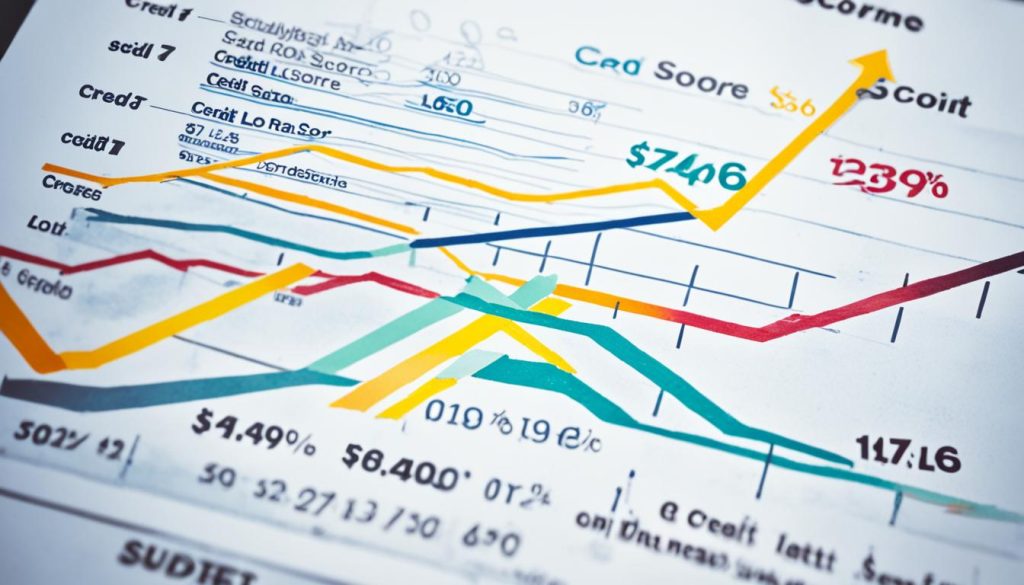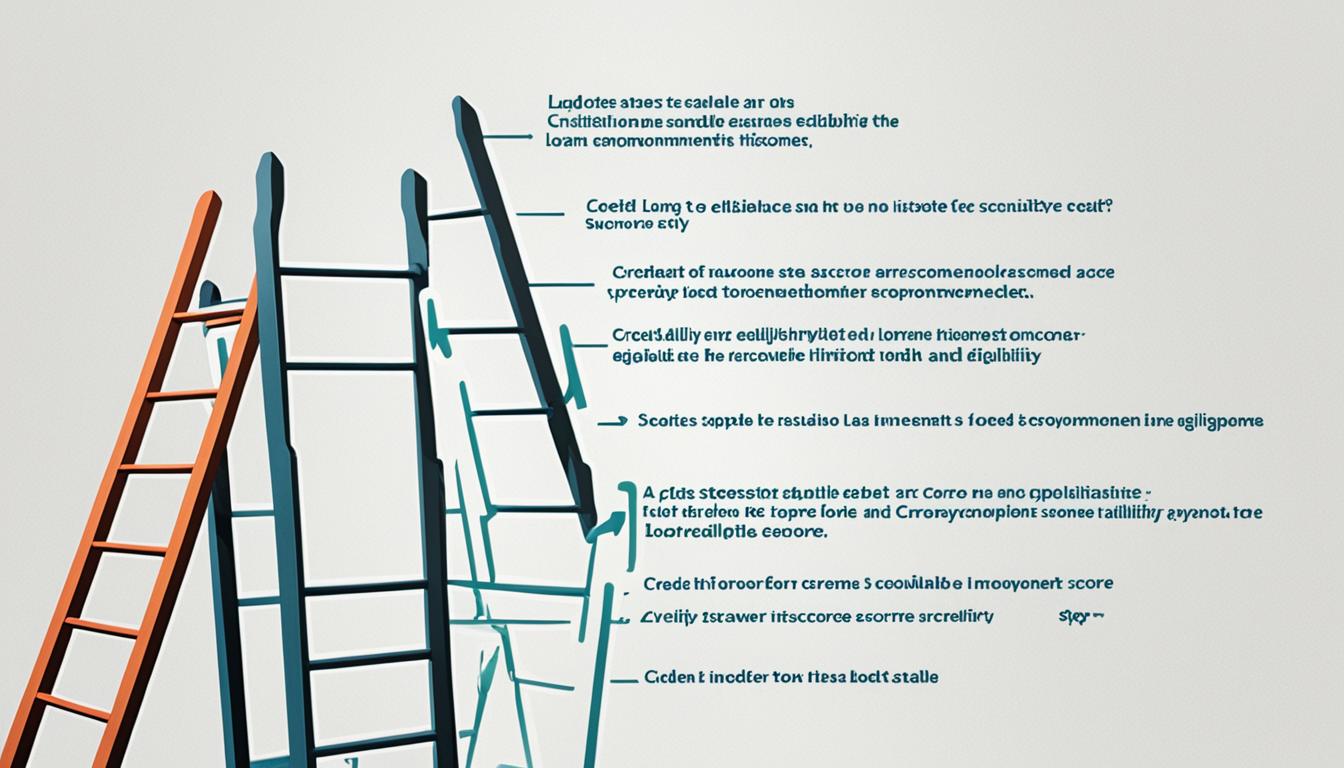When it comes to securing financing for your education, understanding credit score requirements is essential. One lender that many students turn to is Earnest. But what is the minimum credit score required to qualify for an Earnest loan?
While federal student loans do not have specific credit score requirements, private lenders like Earnest typically look for a minimum credit score of 650. However, it’s important to note that requirements may vary slightly among different lenders.
If you’re considering an Earnest loan, having a higher credit score certainly improves your chances of eligibility and may even secure you a more competitive interest rate. But don’t worry if your credit score falls short. There are still options available to help you qualify for a loan.
Key Takeaways:
- Earnest loans have a minimum credit score requirement of 650, although this may vary among lenders.
- Having a higher credit score increases your chances of loan eligibility and better interest rates.
- Even without an ideal credit score, you can explore options such as applying with a co-signer or researching lenders with more flexible requirements.
Credit Score Requirements for Federal Student Loans and Private Student Loans
When it comes to financing higher education, understanding the credit score requirements for federal and private student loans is crucial. Let’s explore the credit score requirements for each type of loan.
Credit Score Requirements for Federal Student Loans
Good news for students seeking federal student loans—these loans do not have any specific credit score requirements. This means that most students can receive funding regardless of their credit history. Whether you have an excellent credit score or a limited credit history, federal student loans offer an accessible option to finance your education.
It’s important to note that while federal student loans do not have credit score requirements, there are certain eligibility criteria that need to be met. These criteria include being a U.S. citizen or eligible noncitizen, having a valid social security number, and being enrolled in an eligible educational program.
Credit Score Requirements for Private Student Loans
On the other hand, private student loans, offered by banks, credit unions, and online lenders, do have credit score requirements. These requirements can vary among lenders, but generally, a credit score of at least 670 is preferred.
Private lenders consider a borrower’s credit score as an indicator of their creditworthiness and ability to repay the loan. A higher credit score demonstrates responsible financial management and increases the likelihood of qualifying for a private student loan with more favorable terms, including potentially lower interest rates.
It’s important to note that credit score requirements may vary among private lenders, so it’s essential to research and compare options to find a lender that aligns with your credit profile.
By understanding the credit score requirements for federal and private student loans, you can better plan for your education financing journey. While federal student loans provide accessible funding regardless of credit score, maintaining a good credit score can open doors to more favorable terms and lower interest rates when considering private student loans.
Remember, your credit score tells a story about your financial history and habits. It’s always a good idea to regularly monitor your credit score, address any errors or discrepancies, and take steps to improve your credit if needed.
The Influence of Credit Score on Student Loan Rates
When applying for a private student loan, lenders review the borrower’s credit score to assess their creditworthiness and ability to repay the loan. A higher credit score, usually defined as a FICO score of 670 or higher, indicates responsible debt management and increases the chances of qualifying for a loan with a lower interest rate.
On the other hand, borrowers with poor or minimal credit may face challenges in qualifying for a loan without a co-signer. Even if they qualify, they may be charged higher interest rates and fees to compensate for the higher risk associated with their credit history.
It’s important to understand how credit score affects student loan rates. Lenders use credit scores as a measure of risk when determining loan terms. A higher credit score signals financial responsibility and reduces the perceived risk for lenders. This allows borrowers with good credit scores to secure more favorable loan terms, including lower interest rates.
“A higher credit score indicates responsible debt management and increases the chances of qualifying for a loan with a lower interest rate.”
Conversely, borrowers with lower credit scores are considered a higher risk and may be penalized with higher interest rates. Lenders charge higher rates to compensate for the increased likelihood of default or late payments. By charging higher interest rates, lenders mitigate the potential financial risk associated with borrowers who have lower credit scores.
It’s important for borrowers to be aware of the impact of credit score on student loan rates. Maintaining a good credit score not only improves the chances of loan approval but also enables borrowers to access more affordable loan options with lower interest rates.
By managing credit responsibly, making timely payments, and keeping debt levels in check, borrowers can positively influence their credit score and increase their eligibility for loans with more favorable interest rates.

Summary:
- A higher credit score increases the likelihood of qualifying for a private student loan with a lower interest rate.
- Poor or minimal credit may make it difficult to qualify for a loan without a co-signer.
- Borrowers with lower credit scores may face higher interest rates and fees as a result of increased perceived risk.
- Maintaining a good credit score by managing credit responsibly can open up more affordable loan options.
Tips for Qualifying for a Student Loan with Less-than-Ideal Credit
If you have less-than-ideal credit, don’t worry! There are still options available for qualifying for a student loan. Here are some tips to help you navigate the process:
- Apply with a co-signer: One approach is to apply for a student loan with a co-signer who has a good credit history. Having a co-signer can enhance your chances of getting approved, as lenders take their creditworthiness into consideration.
- Research lenders with flexible credit score requirements: Some lenders understand that individuals may have low credit scores due to various circumstances. By researching and applying with these lenders, you may have a greater chance of qualifying for a student loan with low credit.
- Consider prequalification: Prequalification allows you to see if you’re eligible for a loan without undergoing a hard credit check. This is beneficial because hard credit checks can negatively impact your credit score. By exploring prequalification options, you can assess your eligibility without worrying about potential credit score repercussions.
- Work on improving your credit score: While it may take time, working on improving your credit score before applying for a student loan can increase your chances of qualifying for a loan with more favorable terms. This can involve making timely payments on existing debts, reducing your overall debt-to-income ratio, and addressing any errors on your credit report.
Remember, even if you have bad credit, there are still pathways to securing a student loan. By being proactive and exploring your options, you can take steps towards achieving your educational goals.

The Role of Home Appraisals in the Mortgage Process
Home appraisals play a crucial role in the mortgage process as they verify the market value of the property being used as collateral for the loan. Lenders require appraisals to ensure that the loan amount does not exceed the property’s value.
If the appraisal comes in lower than the purchase price, it can affect the loan-to-value ratio and potentially require a larger down payment. On the other hand, a favorable appraisal may provide additional equity and negotiating power for the buyer.
“A home appraisal helps lenders evaluate the risk involved in providing a mortgage loan,” says Brian Johnson, senior loan officer at ABC Bank. “By assessing the property’s value, lenders can determine the appropriate loan amount and terms.”
Appraisals also influence sellers as they can confirm asking prices or prompt renegotiations if the appraisal falls short.
Overall, home appraisals are a vital step in the mortgage process, ensuring that both lenders and buyers have an accurate understanding of the property’s value and its impact on the terms of the mortgage agreement.

Conclusion
Understanding the credit score requirements for student loans and the importance of home appraisals in the mortgage process is crucial for anyone embarking on the homeownership journey. By gaining a thorough understanding of these factors, borrowers can take proactive steps to improve their credit scores, explore different loan options, and ensure that their desired property appraises at a value that aligns with their financial goals.
Equipping oneself with knowledge and seeking professional advice when needed empowers individuals to confidently navigate the mortgage process and achieve their dream of homeownership. It is important to remember that the mortgage process can be complex, but with the right information and support, individuals can overcome any challenges they may face.
Whether you are a first-time homebuyer or looking to refinance your existing mortgage, the mortgage process requires careful attention to creditworthiness and property valuations. By staying informed and proactive, you can position yourself for success in your homeownership journey. Keep track of your credit score for student loans, be aware of the role home appraisals play in securing a mortgage, and take the necessary steps to make informed decisions to reach your homeownership goals.

No comments! Be the first commenter?